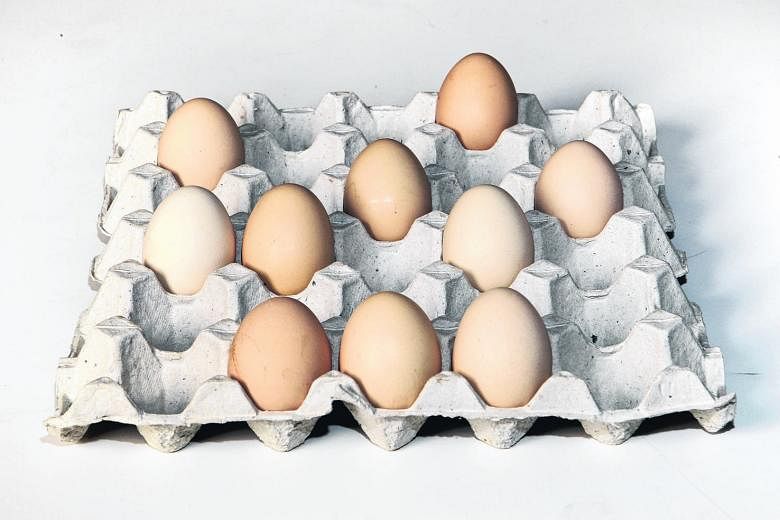SINGAPORE - There is nothing paltry about the number of eggs consumed in Singapore every year. And our appetite for them has been growing.
A check with the Agri-Food & Veterinary Authority (AVA) shows that the yearly per capita consumption of hen eggs rose from 291 eggs in 2006 to 338 eggs in 2016.
However, there are people who avoid eating eggs because they consider them to be rich in cholesterol.
The Straits Times answers some questions consumers in Singapore might have about the eggs here.
Q: Where does Singapore get its eggs from?
A: Around 76 per cent of the eggs eaten here are imported mostly from Malaysia, while farms in Singapore supply the rest.
Local supplier Seng Choon Farm produces 540,000 eggs a day or 11 per cent of the daily consumption here. It expects to raise daily production to 600,000 eggs next year. A spokesman said the farm can produce up to 750,000 eggs a day.
Another major player, Chew's Agriculture, produces half a million eggs daily for the Singapore market, up from 300,000 in 2010.
Q: How many types of eggs are sold in Singapore?
A: There are seven different types: cage-free eggs, certified organic eggs, free-range eggs, omega-3 enriched eggs, pasteurised eggs, brown eggs and kampung eggs.
Q: What health benefits do eggs offer?
A: Eggs are one of the richest sources of dietary cholesterol. They also contain nutrients that may help lower the risk of heart disease.
According to the American Egg Board, an egg has 14 essential nutrients, including vitamin D and choline.
Vitamin D is critical for bone health and immune function, as well as supporting healthy brain development of the foetus during pregnancy. Choline is essential for normal functioning of all cells.
Eggs also contain lutein and zea- xanthin. These antioxidants are believed to reduce the risk of cataracts and slow the progression of age-related macular degeneration.
Q: Should I avoid eggs because of the cholesterol?
A: There is no need to avoid eggs as recent studies show that cholesterol in food has a much smaller effect on a person's harmful cholesterol levels than saturated fats and trans fats, according to Ms Ong Ke Min, a nutritionist at nutrition consultancy Health Can Be Fun.
Dr Charles Chan, a cardiologist at Gleneagles Hospital, said: "While eggs are high in cholesterol, they are also high in omega-3 fatty acids. The effect of egg consumption on blood cholesterol is minimal when compared to the effect of trans fats and saturated fats."
He added that most healthy people can eat up to seven eggs a week with no increase in the risk of heart disease.
Results from the latest studies have led major health advisory groups to relax their recommendations on egg consumption. Dr Chan said: "What has changed is the shift in focus towards a healthy eating pattern, rather than on the avoidance of foods such as eggs."
There is also a lack of epidemiological data to suggest that egg consumption increases the risk of coronary heart disease, he added.
"In fact, egg consumption may be beneficial," he said, pointing to the Japanese diet, which frequently incorporates eggs, and is typically low in total fat and saturated fat. He added that the incidence of declining heart disease in Japan has mirrored the increase in consumption of eggs per capita.
More studies are starting to show that an egg a day might not affect the cholesterol levels of people with high cholesterol, if the rest of their diet is healthy and low in saturated fat, said Ms Chia.
Ms Natalie Goh, chief dietitian at Mount Elizabeth Novena Hospital, agrees that healthy adults can eat an egg a day.
Recent scientific reports have said that people who eat four to six eggs a week were not observed to have a higher risk of cardiovascular disease, she said.
But the picture is less clear for those who eat more than one egg a day, she said. Like all foods, she added, eggs should be eaten in moderation, as part of a balanced diet.
Q: Should I avoid eating egg yolk?
A: Gleneagles Hospital cardiologist Charles Chan points out that there is no need to avoid egg yolk, which contains all the fat in the egg.
"Eating purely egg whites has become popular with people who want to avoid excess cholesterol. But taking both the fat and protein can have a positive effect on blood sugar," he said.
"Consuming the fat satiates your appetite but slows down the absorption of food. By eating only the egg white, you'll miss out on healthy nutrients."
According to the American Egg Board, egg whites contain some high-quality protein, riboflavin and selenium, but a big proportion of an egg's nutrients is found in the yolk.


